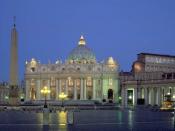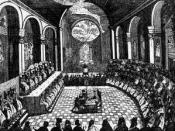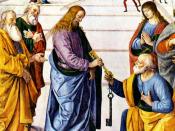Lortz an intellectual, Catholic Historian explains the reformation with reference to the medieval break up of Western Christianity. Lortz provides revealing evidence of a late medieval break down in the universality of the Catholic Church, which shook it to its very foundations. Firstly, Clement V removed the seat of the Roman See to Avignon in France from 1309 till 1377. Petrarch, the "father of humanism", termed this period the "Babylonian Captivity" of the papacy, a sentiment shared by many non-French. In 1377 Gregory XI's returned to Rome, by 1378 he was forced to evacuate back to Avignon where he re-established himself as pope. The result of this was the creation of two popes Urban VI in Rome and in Robert of Geneva in Avignon, the two popes excommunicated each other. European loyalty became divided, England and the German empire sided with Urban, France and the kings of Spain with Clement.
In 1409 the Council of Pisa attempted to re-unify the church under one pope but ironically created a third pope. Secondly the establishment of the German national reform council with a "radically separatist" stance acted to distance Germany from Rome. Thirdly the church influence in the political, social, economic and legal field was damaged as a result of the growing desire amongst national rulers and in Germany territorial prices, to centralize power into their own hands and away from other interest groups, including the church. This is evident in the increased tendency towards national churches in England, France, Spain, and in Germany territorial churches. Lastly, Germany's refusal to raise taxation for or become directly involved in, a papal to war against the Turks, then the enemies of Christianity and resultant fall of Constantinople in 1453, to the Turks, is evidence of Europe's inability to unite against its enemies.
Although humanism is often viewed as returning unity to the church, for Lortz, it actually was a process of secularization. The move away from a universal church represents an alteration in the people's attachment to Catholicism which for him led to the reformation. This argument exists as part of Lortz's general stance on the causes of the reformation, he blames the state of the catholic church at the begging of the sixteenth century for marking Luther and the reformation a possibility. Reform states Lortz "had been due for three hundred years".1
Karl Adam similarly views the Catholic Church as responsible for causing the reformation. He emphasizes the excessive wealth of the clergy derived from taxation and other moneymaking practices including the abuse of the sale of indulgence and benefices, discussed in greater depth below, all of which acted to prepare the reformation. The church was indeed wealthy the Pope's yearly income was greater than that of any German emperor, many church's had large reserves of gold and silver in fact one third of all German land was owned by the papacy. Taxation represents around half of the Church's income, according to Lortz. This web of taxation was introduced by the 'Camera Apostolica', the central board of finance for the Catholic Church. Adam describes the breadth of this taxation program, first pallium-money, was a tax paid by an archbishop, bishop or abbot upon their appointment. Second the 'spolia', which took a prelates assets upon their death, numerous administrative taxes and procreation for papal visitations were also included. Finally their were taxes on the revenues of vacant benefices, a religious appointment in which the holder can raise money, payment of a large percentage of ones first year's income, from all ecclesiastical appointments made by the Pope. Wealth was also acquired from the sale of indulgences a practice, which became increasingly common in the late medieval period and also benefices, which generated money for the holder and Rome. The economic burdens imposed by the church created huge inequalities between the laity and the clergy, generated much anticlericalism which, as argued below, was a central pre-requisite for the reformation. Middle and upper class resentment against the wealth of the church also developed during this period. Additionally the papal revenues raised in Germany were sent to Rome. This crated resentment especially amongst the middle and higher classes, who already disliked the pope's interference in local ecclesiastical and political matters.
The corruption within the church is centrally important to both Lortz and Adams general thesis, that the church itself caused the reformation. The abuses of the church in the 15th Century were extensive and are well documented and they took various forms; sexual misconduct, violence, the improper sale of indulgences, Simony and nepotism, incompetence, absenteeism and general ignorance. The improper sale of indulgences spark martin Luther's 95 thesis and subsequent reforms and therefore provided a good example for anaylsis here. Indulgences are a feature of the Catholic faith, the church offer relief from the guilt of sin's already forgiven by God for a financial payment, but by the 16th Century the practice had become removed from its original purpous. For example "the church today readily concedes that the indulgence traffic was a scandal"2 The sale of indulgence was a feature of Catholic faith designed to offer relief from the guilt of sin's already forgiven by God, in the late medieval period the practice corrupt, the words of a catholic preachers expose this "as soon as the coin in the coffer rings the soul from purgatory springs." (p31 mcgrath ) in other words an indulgence became a means of buying gods forgiveness of a sin. Albert, The pope arranged with Albert, the Archbishop of Mainz that he could become the bishop, despite being too young and already holding too many ecclesiastical offices, for a financial payment. So that Albert could raise the money needed, the people gave him permission to sell indulgences with half the proceeds going to Rome the other half to Albert, needless to say indulgences were sold improperly. Such abuses were hypocritical, coupled with the clerical privileges and exemption from tax fueled the growing anticlerical passions of many Germans.
Francis Rapp believes that the spiritual abuses of the Catholic Church are exaggerated. He finds no evidence of increasing immorality, when measured as sexual incontinence and drawling. Additionally Rapp does not find a decline in the educational standard of the clergy but instead an improvement. He explains the increasing number of complains and anticlericalism as the product of the changing standards that are applied to the clergy. Similarly Bernard Moeller in an article entitled "piety in Germany around 1500" argues that in every measurable way lay devotion to popular religion increased in Germany between, 1450 and 1520. He cites the growth in the number of brotherhoods, lay movements that paid a preacher to perform mass upon the death of one of its own members, as evidence of increasing growth in popular piety, in Hamburg ninety-five such brotherhoods existed many of which were created after 1450. It appears in light of both Rapp and Moeller's contribution that the spirituality of the laity grew in the period preceding the reformation and that this is what triggered the growing anticlericalism.
Bob Scribner links anticlericalism more concretely to the reformation in his article "anticlericalism and the cities". For Scribner anticlericalism can be viewed in two ways, firstly as an emotional or psychological stance or secondly as a form of behavior or action. He argues that anticlericalism created disillusionment with the old church, which emptied it of its moral authority. Psychologically this humanized the clergy and justified "direct or even violent"3 Scribner views this development, when coupled with the confrontational nature of many reformation preachers as leading to the political action which, for Scribner, was a central feature of the reformation process within the cities. For example in Aschersleben, a conflict between a group of anticlerical laymen how demanded the removal of the catholic preacher Johann Weber and the installment of a reform preachers and the Archbishop of Mainz how refused to let any evangelical preachers into the city. From 1525 the citizenry initiated a hate campaign against Weber involving "singing slanderous songs... affixing libels to his door, blocking the entry with stones, braking open the wooden shutters on his bedroom and hurling a rock through the unprotected window,"4 on the second of July 1527 their was an attempt to break into Weber's house, on the seventeenth of August a group chanted, "death to monks and priests, in the Devil's name", as well as defecating on his doorstep, all the above resentment lead the priest to resign, the town council then appointed a reform preacher. Magisterial consent evident and both their inaction against the anticlerical attack and the ushering in of the replacement evangelical reformer did play a role in bringing reformation but the more significant role is played by anticlericalism.


